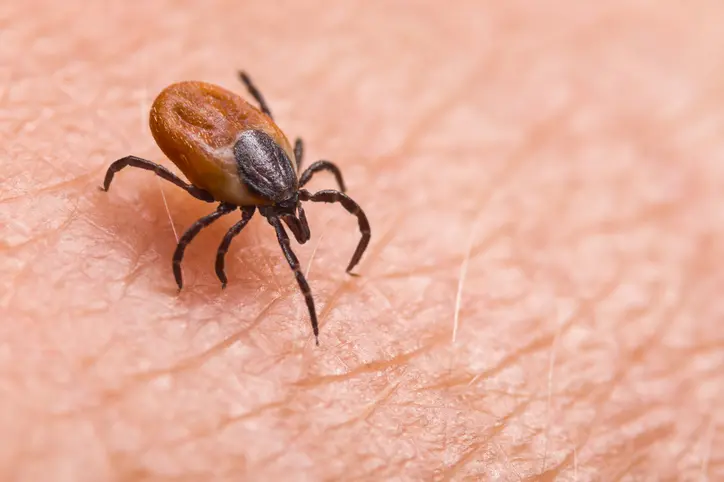Can Ticks Make You Allergic to Meat?
Imagine enjoying a juicy steak one day and suddenly becoming allergic the next—could a tick bite really be to blame?

Ticks Don’t Just Suck Your Blood
Ticks are on the move now that spring is in full swing. They aren’t just annoying blood suckers, they also carry a lot of diseases with them. According to the Centers for Disease Control, ticks carry over 15 different diseases that can cause harm to humans.
Not only that, they can also do harm to your pets as well. There’s no way to tell by looking at a tick if it is carrying a disease or not. There are certain ticks that generally do, but you never really know until it happens. It only takes one bite to transfer the diseases to you as well. If you are able to remove the tick and get it to a lab, there are certain pathogens that can be tested.
One of the most common tick borne diseases that you’ve most likely heard of is Lyme Disease. This disease has typical symptoms which include fever, headache, fatigue, and in some cases a Southern Tick Assoicated Rash Illness, which shares symptoms with Lyme disease but is caused by a different pathogen.
The most dangerous aspect of this disease comes when it is left untreated. When left untreated, the disease can spread and effect areas such as the heart, nervous system, and joints. This can cause lameness and loss of appetite, as well as depression in both humans and pets.
Now studies are showing a new kind of side effect from tick bites and that is the addition of new allergies appearing.
A Bite That’s More Than “Meats” the Eye
Different ticks, whether it be Arizona ticks or any other, carry different kinds of diseases. The Lone Star Tick is one that has started to spread a rather unique issue. This species of tick is very aggressive and in addition to their bites, extreme itching is an additional side effect.
This isn’t just your typical itchy bug bite either. Itchiness has been known to last for weeks, even months, with a bite from a Lone Star Tick. In addition to the itchiness, this tick bite can cause an allergy called Alpha-gal.
What is Alpha-gal?
Many people associate it with beef, but can you be allergic to pork due to tick bites? Since pork contains Alpha-gal, some individuals with it may also experience allergic reactions to pork, lamb, and other red meats.
The tricky thing is, is that this allergy doesn’t hit immediately like most allergies do within 15-20 minutes, Alpha-gal has been shown to take sometimes up to 2 to 4 hours before any symptoms start to show. You might have a burger for lunch but not start to notice any sort of reaction until dinner time.
This makes diagnosis very difficult, and many people who have been bitten and are being misdiagnosed because of it. Unfortunately there isn’t any treatment for this allergy caused by the tick bites, so if you get it, it could be your quick introduction to being a vegetarian.
Scientists say there is a possibility that the allergy could work it’s way out of your system after about 5 years if there are no other bites that occur, but it’s still not official that it could be reversed.
Prevention Is a Better Option Than Giving up Your Favorite Meals
If the thought of giving up your BBQ’s this summer isn’t something you want to deal with, we recommend focusing on preventing tick bites instead.
Keeping out of the woods and tall grasses is probably the easiest step you can take to reduce the chances of being bitten by a tick, but if you are an avid outdoors-man or hunter, it might not be an option. Try and keep your pets out of wooded areas and tall grasses as well, as they can also bring in ticks into your home.
Lawn maintenance is important as well. Keeping your grass mowed short can eliminate areas of shelter for ticks. Depending on the time of year, you may also have leaf piles around your yard, which is another prime location for ticks to hide out.
When it comes to venturing outdoors, it’s best to wear long clothing like pants and long sleeve shirts. You can also tuck your pants into your socks for added protection. Oftentimes, ticks will get on your shoes or pants as you are walking thorough wooded areas and tall grasses and then continue to travel along clothing lines until they find their way onto your skin. Long sleeves and pants can help prevent this.
Another thing to do is thoroughly inspect yourself and your pets any time you have been in tick populated areas to ensure none have gotten on you or your pets. You can also have the perimeter around your home treated for pests by a pest control service to reduce numbers near your home.
Protect Your Home and Health With Rove Pest Control
A single tick bite could change your diet forever. Alpha-gal syndrome, a red meat allergy linked to tick bites, is a growing concern—especially in tick-heavy regions. Protect yourself and your family by keeping ticks out of your yard and off your skin.
At Rove Pest Control, we provide expert tick control solutions to reduce tick populations and minimize your risk of bites. Don’t wait until a bite leads to lifelong allergies—take action today. Call or contact us online for a free consultation, and let us help you reclaim your outdoor spaces tick-free!
